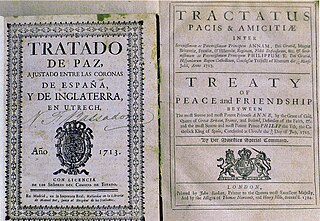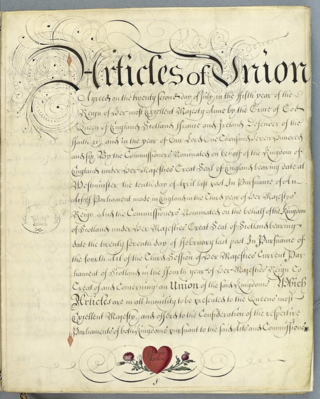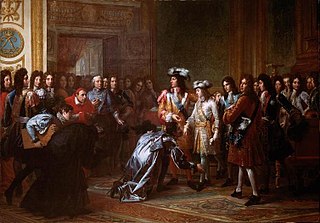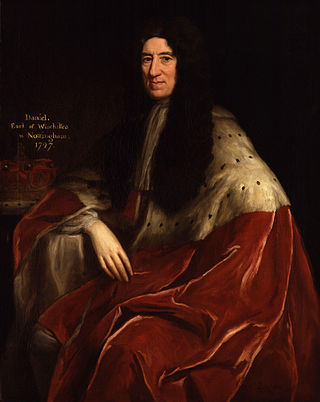The Whigs were a political faction and then a political party in the Parliaments of England, Scotland, Ireland, Great Britain, and the United Kingdom. Between the 1680s and the 1850s, the Whigs contested power with their rivals, the Tories. The Whigs merged into the Liberal Party with the Peelites and Radicals in the 1850s. Many Whigs left the Liberal Party in 1886 to form the Liberal Unionist Party, which merged into the Conservative Party in 1912.

George I was King of Great Britain and Ireland from 1 August 1714 and ruler of the Electorate of Hanover within the Holy Roman Empire from 23 January 1698 until his death in 1727. He was the first British monarch of the House of Hanover.

William III, also widely known as William of Orange, was the sovereign Prince of Orange from birth, Stadtholder of Holland, Zeeland, Utrecht, Guelders, and Overijssel in the Dutch Republic from the 1670s, and King of England, Ireland, and Scotland from 1689 until his death in 1702. As King of Scotland, he is known as William II. He ruled Britain and Ireland alongside his wife, Queen Mary II, and their joint reign is known as that of William and Mary.

Robert Walpole, 1st Earl of Orford,, known between 1725 and 1742 as Sir Robert Walpole, was a British statesman and Whig politician who, as First Lord of the Treasury, Chancellor of the Exchequer, and Leader of the House of Commons, is generally regarded as the de facto first Prime Minister of Great Britain.

General John Churchill, 1st Duke of Marlborough, 1st Prince of Mindelheim, 1st Count of Nellenburg, Prince of the Holy Roman Empire, was an English soldier and statesman. From a gentry family, he served first as a page at the court of the House of Stuart under James, Duke of York, through the 1670s and early 1680s, earning military and political advancement through his courage and diplomatic skill. He is known for never having lost a battle.

The Peace of Utrecht was a series of peace treaties signed by the belligerents in the War of the Spanish Succession, in the Dutch city of Utrecht between April 1713 and February 1715. The war involved three contenders for the vacant throne of Spain, and involved much of Europe for over a decade. The main action saw France as the defender of Spain against a multinational coalition. The war was very expensive and bloody, and finally stalemated. Essentially, the treaties allowed Philip V to keep the Spanish throne in return for permanently renouncing his claim to the French throne, along with other necessary guarantees that would ensure that France and Spain should not merge, thus preserving the balance of power in Europe.

Robert Harley, 1st Earl of Oxford and Earl Mortimer, KG PC FRS was an English statesman and peer of the late Stuart and early Georgian periods. He began his career as a Whig, before defecting to a new Tory ministry. He was raised to the peerage of Great Britain as an earl in 1711. Between 1711 and 1714 he served as Lord High Treasurer, effectively Queen Anne's chief minister. He has been called a prime minister, although it is generally accepted that the de facto first minister to be a prime minister was Robert Walpole in 1721.
The Tories were a loosely organised political faction and later a political party, in the Parliaments of England, Scotland, Ireland, Great Britain and the United Kingdom. They first emerged during the 1679 Exclusion Crisis, when they opposed Whig efforts to exclude James, Duke of York from the succession on the grounds of his Catholicism. Despite their fervent opposition to state-sponsored Catholicism, Tories opposed exclusion in the belief inheritance based on birth was the foundation of a stable society.

The Treaty of London (1700) or Second Partition Treaty was the second attempt by Louis XIV of France and William III of England to impose a diplomatic solution to the issues that led to the 1701-1714 War of the Spanish Succession. Both divided the Spanish Empire without prior consultation and since the Spanish viewed an undivided Empire as non-negotiable, historians generally view them as largely unenforceable.

The Treaty of Union is the name usually now given to the treaty which led to the creation of the new state of Great Britain, providing that the Kingdom of England and the Kingdom of Scotland were to be "United into One Kingdom by the Name of Great Britain". At the time it was more often referred to as the Articles of Union.

The first Parliament of the Kingdom of Great Britain was established in 1707 after the merger of the Kingdom of England and the Kingdom of Scotland. It was in fact the 4th and last session of the 2nd Parliament of Queen Anne suitably renamed: no fresh elections were held in England or in Wales, and the existing members of the House of Commons of England sat as members of the new House of Commons of Great Britain. In Scotland, prior to the union coming into effect, the Scottish Parliament appointed sixteen peers and 45 Members of Parliaments to join their English counterparts at Westminster.
The Whig Junto is the name given to a group of leading Whigs who were seen to direct the management of the Whig Party and often the government, during the reigns of William III and Anne. The Whig Junto proper consisted of John Somers, later Baron Somers; Charles Montagu, later Earl of Halifax; Thomas Wharton, later Marquess of Wharton, and Edward Russell, later Earl of Orford. They came to prominence due to the favour of Robert Spencer, 2nd Earl of Sunderland and during the reign of Queen Anne, Sunderland's son, the 3rd Earl succeeded his father. Opponents gave them the nickname "the five tyrannising lords". Other figures prominent around the edges of the Junto include Sir John Trenchard and Thomas Tollemache.

The Treaty of Den Haag, or Treaty of The Hague, was signed on 7 September 1701 between England, the Holy Roman Emperor Leopold I, and the United Provinces. It reconstituted the 1689 anti-French Grand Alliance in response to the issues that resulted in the War of the Spanish Succession.
Events from the year 1701 in England.
Robert Monckton was an English landowner and Whig politician who sat in the English and British House of Commons between 1695 and 1713. He took an active part supporting William of Orange in the Glorious Revolution, and was notable for his involvement in a number of exceptionally bitter and prolonged electoral disputes.

The 2nd Parliament of King William III and Queen Mary II was summoned by William III of England and Mary II of England on 6 February 1690 and assembled on 20 March 1690.

The 3rd Parliament of William III was summoned by William III of England on 12 October 1695 and assembled on 22 November 1695. It was the first election to be contested under the terms of the new Triennial Act passed in the previous Parliament which, amongst other things, limited the duration of the Parliament to 3 years. Its composition was 257 Whigs, 203 Tories and 53 others; Paul Foley, a Country Whig and member for Hereford, was installed as Speaker of the House of Commons.

The 4th Parliament of William III was summoned by William III of England on 13 July 1698 and assembled on 24 August 1698. The party political constitution of the new House of Commons was 246 Whigs, 208 Tories and 59 others. Sir Thomas Littleton, the Whig member for Woodstock, was elected Speaker of the House. The house was divided between the pro-government faction led by the Whig Junto and a Country Whig-Tory alliance, the New Country party, led by Robert Harley.

The 6th Parliament of William III was summoned by William III of England on 3 November 1701 and assembled on 30 December 1701. Its composition was 248 Whigs, 240 Tories and 24 others; Robert Harley, the member for Radnor, was re-elected Speaker of the House of Commons.

No Peace Without Spain was a popular British political slogan of the early eighteenth century. It referred to the ongoing War of the Spanish Succession (1701–1714) in which Britain was a leading participant. It implied that no peace treaty could be agreed with Britain's principal enemy Louis XIV of France that allowed Philip, the French candidate, to retain the Spanish crown. The term became a rallying cry for opposition to the Tory government of Robert Harley, Earl of Oxford and the terms of the Treaty of Utrecht.













